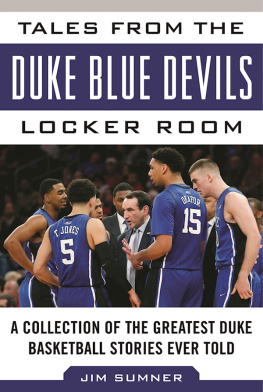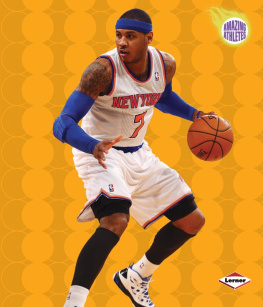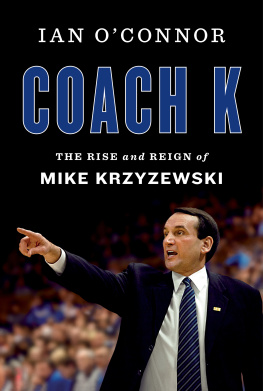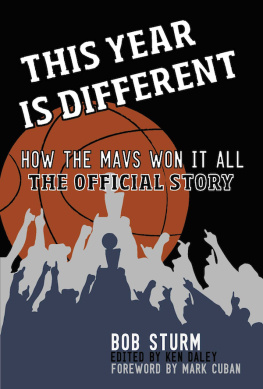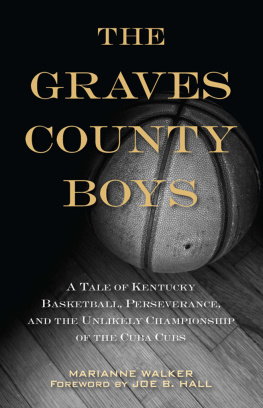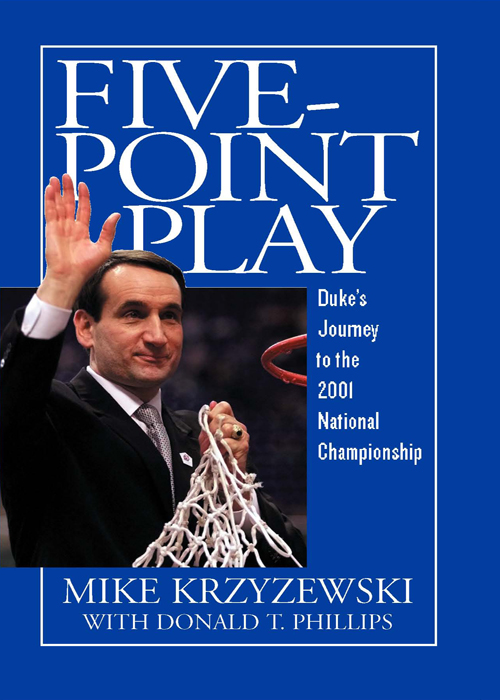FIVE-POINT PLAY. Copyright 2001 by Mike Krzyzewski. All rights reserved. No part of this book may be reproduced in any form or by any electronic or mechanical means, including information storage and retrieval systems, without permission in writing from the publisher, except by a reviewer who may quote brief passages in a review.
Warner Books,
Hachette Book Group
237 Park Avenue
New York, NY 10017
Visit our website at www.HachetteBookGroup.com.
ISBN: 978-0-7595-2642-6
A hardcover edition of this book was published in 2001 by Warner Books.
First eBook Edition: November 2001
Dedicated to the
2001 Duke basketball team
by Shane Battier
With about 10 seconds to go in the 2001 national championship game and our opponent, Arizona, letting the clock run out, I crouched down and said a little prayer of thanks for all our blessings. Then the clock hit zero and I had the most unbelievable sensation rush through my body, my mind, and my soul. The victory celebration with my teammates was an unforgettable experiencea beautiful moment.
We had talked about winning championships at Duke all the timeso much so that it almost became an intangible thing. Well, at that moment, it became tangible. Everything we did during the yearall the practices, all the hard work, all the things we said to each othersuddenly made sense. I finally understood what being a champion was all about. And that was almost as cool as winning.
Between my sophomore and junior years, several players left the program early to pursue careers in the NBA. Coach K never wavered, though. In his commanding voice and optimistic tone, he told us that we were going to be okaythat no matter what happened, we were still going to be Duke, that we were going to play at a high level, and that we were going to win. Because I believed in him, I took what I had learned during my first two years and stepped forward to keep the program strong. So did my team-mates, Chris Carrawell and Nate James.
During my junior year, we won the Atlantic Coast Conference regular season, we won the ACC tournament, and we made it all the way to the Sweet 16 in the NCAA tournament. That was a pretty good achievement for a team with a lot of very young players. But it was in my senior year that everything came together. Our young players had a full year under their belts. We had gained experience as a team. And our play improved and our confidence grew as the season progressed. It was apparent to everybody that something very special was in the making.
The book you are about to read chronicles my senior yearDukes 2001 national championship season. While the basketball specifics are interesting in their own right, they are only peripheral to a much more important story. The truth is that basketball was only the vehicle for a remarkable journey filled with human emotions, peaks and valleys, major adversity, courage, love, and, ultimately, triumph. In this book, Coach provides a behind-the-scenes look at how he forges a successful team environment. He shows how many of our wins on the court were really the result of connections off the courtfashioned during moments of privacy with individual players. And he reveals, with specific examples, his coaching philosophy that success is not as much about the Xs and Os as it is about human relationships.
My own personal relationship with Coach was anything but one-way. He listened to what I had to say. He was sensitive to my opinions and to my feelings. We discussed things in detail. At times we joked, and at other times, we were extremely serious. There wasnt a day in my career at Duke that I didnt look him in the eye and believe what he said to me. He asked me to be one of the leaders of our team and an extension of himself out on the basketball courtand thats what I tried to do.
When I was younger, Coach actually had more confidence in me than I had in myself. He kept telling me that I was going to be a great player, a championand that I could achieve every dream I ever had. After awhile, with that kind of encouragement, I started to believe it myself. During my senior year, I placed four gold cards on the wall of my apartment. Each card listed a goal I hoped to achieve: Win the national championship, be First-Team All-America, win the Player of the Year Award, and be Academic All-America. I achieved all those goals. A lot of my individual success is owed to the support my parents provided, to my teammates, and to my own inner work ethic. But I also know in my heart that, if it had not been for the friendship and coaching of Mike Krzyzewski, none of it would have been possible.
Its very rare, especially in an athletic world that is so focused on winning games, to find a man who both inspires and demands adherence to higher principles. With Coach, its not just about winning games. Its about performing with class and integrity. Its about having fun along the way. Its about knowing who you are. And its about continually improving yourself.
During the season, I watched my teammates improve to a level that some of them did not know they could reach. Thats another of Coachs strengths. He sees each individual player for who he is and he finds a way to bring out the best in everybody. Then he coaches us all how to be part of a successful team. In turn, that teaches us how to be successful in life.
I count my blessings to have had the opportunity to spend four years at Duke with Coach. During that time, I not only became a champion, I became a man. So read along now, and see how Coach took a group of young players, elevated them to the next level, and made them all champions.
During the season,
Your team should be led with exuberance and excitement.
You should live the journey.
You should live it right.
You should live it together.
You should live it shared.
You should try to make one another better.
You should get on one another if somebodys not doing their part.
You should hug one another when they are.
You should be disappointed in a loss and exhilarated in a win.
Its all about the journey.
Mike Krzyzewski
On March 29, 1999, Duke lost the NCAA national championship game to the University of Connecticut by three points. We had a very strong team that yearled by three-time All-America Trajan Langdon and the national player of the year, Elton Brand. Wed sailed through the regular season and won the Atlantic Coast Conference title and then cruised through the postseason with championships in both the ACC tournament and NCAA East Regional. Nearly everybody was picking us to win it all. And why not? We were 371 and our average margin of victory was over 20 points per game. We did manage to beat a great Michigan State team in the Final Four semifinal, but a national championship was not to be.
Immediately after the season ended, I underwent hip replacement surgery. During those first few days recuperating in my hospital room, I began to think about the upcoming season and how I would regroup our team with three seniors departing (including Trajan Langdon). At this point I invited Elton Brand and his mom to come over for a chat. There had been a great deal of speculation about Elton, a sophomore, leaving school early to pursue a career in the NBA, and I simply needed to know if he was going to be part of next years team or not. However, I could tell as soon as he walked into the room that he wanted to leave. Eltons eyes gave him away. So I told him that if leaving was best for him and for his mother, then Id be fine with it, and so would Duke University.



